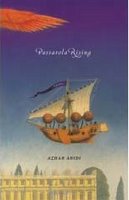
Just finished reading Passarola...Abidi does a fine job with a story that is almost enchantingly of the age of European scientific discovery and the clash between the Church and Science...wonder where Abidi gets all this material and interest...probably this...may help explain...
At any rate, Abidi has a very clean and direct style of writing, so much so, that earlier on in the novel his writing is almost telegraphic: the sentences are short and the tone clipped. He maintains an almost formal style of prose to suit the subject at hand and the period, yet, the style is not cumbersome or tedious.
He drops names quite nonchalantly, what with Voltaire, Rousseau and Linnaeus figuring at various junctures.
The book is about the adventures of a flying ship, the Passarola, which rises into air because of the volume displaced by the ship and especially by copper spheres on board, which have the air sucked out of them by means of vacuum pumps [no, this is no secret so I am not really giving anything away...].
Bartolomeu, the creator of Passarola and his younger brother Alexandre, the narrator, have several adventures in the ship and predictably, also encounter many a hardship. There are fairly vivid descriptions of travels overland many european nations. But the trip north to the arctic lands (past the Laplands) is most notable for the rigors it exposes them to and the visions it provides...not in the least of the magical aurora borealis (pp 177-8):
[quote]A scarf of bright light began to rise from the horizon, gliding swiftly up into the sky...Soon the sky below us was also glowing with fiery orange and strange purple lights. Some of them had distinct pulsing forms, and tendrils, red and white, that extended up into the void, like roots of some celestial garden...Green waves rippled into the distance and thin crimson, violet and blue clouds, like strands of a woman's hair, pulsed through its medium.[/quote]
...
The Passarola also had an Indian connection when Barolomeu was sent to Pondicherry to defend the French possessions! Well-travelled ship indeed.
Abidi has maintained a fine control over a subject and time period that is very European...his scenes and observations are quite well-executed, he tries to give one a sense of place as the Passarola flies on one its several expeditions, he is quite good with his nautical tems and actions on deck, he is careful to record the various altitudes the ship cruises at and the vistas available to the voyagers from up above -- yet, there are times when all his descriptive powers are not able to convey a truly vivid sense of what is happening. Maybe because the voyages are so far above land that the interactions with real people are few -- it is mostly Bartolomeu and Alexandre in the ship and the account often reads like a log book. A flying/floating ship is cause for wonder but there is no element of fantasy here neither of any real liana-hacking, piranha-fighting, spine-tingling adventure (no, I don't think I was really looking for an Indiana Jones-style treasure-hunt :)...)....very often the details of their voyages are skimpy and any scientific purpose to them almost perfunctorily presented.
Yet, I liked the book for its mock-grave manner, its historical tone, its attempt to present a tale of discovery and pioneering experiments and the famed unbending scientific spirit...and also, in some subtle manner, its attempt to explore concepts of home ["...When one leaves a place, things change and the place ceases to exist..." pp 164-5] and...Truth ["Truth is what you believe," Bartolomeu tells Alexandre towards the end of the story(p 235)]. Nothing shockingly original, but in the manner of the book, without artifice.

No comments:
Post a Comment